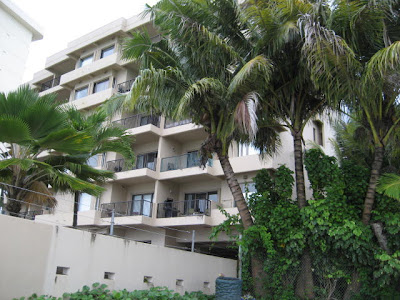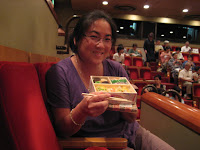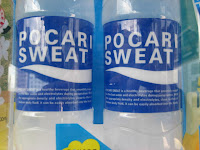Over Labor Day weekend, K and I took our first adventure together in a long while and visited Tokyo. As we've been challenged by some friends at home to "travel our asses off" while in Guam, let me assure you we not only saw a lot in Japan, but we quite literally had to have traveled some of our asses off with all the walking we did. This post will be about what we did to replenish all those calories.
Episode I: Food
I will in no way attempt to mimic a foodie blog here with recipes, etc. (though if you're into that you can find a
great one here). Mostly this is just some musings on the surprises and differences between my Western food experience and my touristy scratching of the Tokyo culinary surface.
Memorable food experience #1
After dropping off our luggage at our ryoken (more on our lodgings later), we found ourselves in a quaint little street market area off a pretty residential neighborhood not too far from where we were staying. The smells of street vendor food were amazing, but after schlepping our suitcases quite some distance from the train station (transportation post coming too), we needed a place to sit down and take a load off.
We chose our restaurant because of the neatly removed shoes that covered the entryway and because we could see all the patrons were seated around place settings on the floor. We had no idea what was on the menu, and after a brief interchange between K and a waitress, we decided to get the fixed menu for 1000 yen (or roughly $12-13 each). As it turned out, this was the best meal for the price during our entire stay.
We had incorrectly assumed at the door that we'd chosen a Japanese restaurant. We quickly reevaluated, thinking we were perhaps eating Turkish or some other Middle Eastern type of fare based on the dresses hanging from the walls, the camel at the food pick-up window, and the large blue evil eye charm that we saw all over Greece two years ago. Currently I'm leaning
toward Iranian after doing some image searching for flags online.
Regardless of where the food was from, the fixed menu included soup, a lamb stew (an animal I don't usually like, but that was amazing), a chickpea dish, rice, naan, a green salad with an egg salad side, and to drink, tea and mango juice. All this food was in front of us within two minutes of sitting down. (Did you hear that, Guam? Two minutes!) In addition, servers came around with platters to serve us other "finger food" items - dates, fried potato balls, and a filo dough jelly roll-like item.
Dinner that night was much more complicated in the hustle and bustle of downtown Ueno, and we tried three restaurants before our language ignorance allowed us to gain sustenance at a noodle house. Choosing your meal from a picture menu can be a bit scary at first, but it didn't take long to roll with it.
Memorable food experience #2
Growing up in the household of a hunter/fisher, I've had plenty of fresh-to-my-plate food in my time. Of course at the age of eight or so, you're not too excited, either emotionally or gustatorially, to eat Bambi, Thumper, or any of their friends, though as an adult I've paid good money for venison and rabbit in restaurants and have been very impressed. Probably the freshest food I experienced growing up was trout - from stream (or stocked lake) to plate within hours. I had fewer emotional issues there, but I still don't like the taste of white, flaky fish.
But sushi - now there's a food I can sink my teeth into. And when it comes to sushi, of course you want super fresh. So we went to the
Tsukiji fish market, the largest wholesale fish market in the world. K had been there during her first trip to Tokyo and managed to go to the frozen tuna auction (that's how they kill the bacteria/parasites for sushi - freeze for at least 24 hours), which starts at 5 AM. The thought of getting up that early when I'm
not on vacation is painful, and there was no guarantee we'd be allowed in since they limit viewers to 140 each day, first come first served. So I decided to pass on that aspect of sightseeing, though
Wikipedia has a nice post-auction photo, shown here.

While we didn't see the bidding on the huge tuna, there was plenty of other fish for sale to see. We got a map of the market from a security guard who cautioned us to avoid off-limits areas, to ask permission of vendors before taking photos, and to stay out of their way. They weren't tourist attractions, they were working. The dark grey areas on the map below were the off-limits zones, and anything circled we were allowed to see. He was a bit intimidating, and since everyone looked so busy, I took a lot fewer pictures than I normally would have.
 |
| (click for larger image) |
Most of the market was cramped warehouse space with tons of really narrow aisles. Each vendor had stacks of boxes of fruits and veggies in the produce area, or a variety of fish or other sea critters, sometimes in bins in water, sometimes still alive and sometimes still frozen.
It makes sense that these people need a lot of ice, but it hadn't occurred to me what that looked like until we saw the ice truck. We saw a few individuals transporting large fish on these flatbed handtrucks too, but most
of the moving around had finished by the time we got there. The market is shut down by 1 PM since they all start at three in the morning.
 |
| This is my favorite photograph of the entire trip - credit K. |
Just a few seconds after she snapped this, someone came out, picked up the fish head, and took it inside. It's unclear whether there was still some good meat in it or not, but we
did watch a fishmonger cutting out surprisingly large pieces of yummy
looking tuna from another head just minutes before.
So how does the ginormous frozen tuna eventually make it to your plate? The fish are cut into more manageable pieces using a band saw.
This gentleman appeared to be sorting live, surprisingly colorful shrimp by size into the green trays.
The only picture I specifically went back to snap, after K asked permission, was this one.
I've been on the hunt for an octopus while diving in Guam for weeks
now, all in vain. They are elusive critters, often superbly camouflaged, and they hide
in tiny holes. How people find and catch them for eating is a mystery. This many
octopi in one place was sort of crazy to me.
All fish exposure in the market came after we'd had our delicious, and quite large sushi breakfast. Perhaps this was better for us, though I was more fascinated than upset by anything I saw. This
is the storefront of the restaurant we chose, really for no other
reason than it had a nice picture out front and no line, unlike several other stores we passed. Usually that's a bad sign in the States, but I figured we couldn't go wrong here. The place was
no wider than the doors to the end of the white banner, and most of that
was behind-the-counter space for the sushi chefs. The counter we sat at seated eight to ten people.
We chose from another set menu and both got option D for 2800 yen. Our food came piecemeal
and we ate it as we went, so there's no one picture of the whole spread, but this meal afforded us twelve different
pieces of sea creature, and at $35 American seemed pretty reasonably priced.
I think it's a bit strange that I can remember how my attitude about sushi changed over the years. I'm sure I can't recount this for any other type of food, so it must mean something. My very first sushi exposure was during college when a friend practically dragged me to
Taipei and Tokyo in Northampton. She was from the Pacific Northwest (Seattle?), grew up on sushi, and was adamant I try it after she found out I never had. At the time, the idea of eating raw fish creeped me out, but she was determined to convert me. I hope that woman got her toaster, because sushi has pretty much grown to be my favorite food.
My move to California allowed me to gradually become a sushi fan, and as I began to figure out what I liked, I also became bolder, always trying one new type of fish every time I went out. Essentially a complete stranger introduced me to another sushi restaurant, the Mikado, which used to be on Grand Ave. in my "current" Oakland neighborhood. That stranger was K, and it was the first time we hung out as friends, so was our first "date," so to speak. That place became my go-to cheap-but-good sushi spot until it went out of business.
I can also say that my worst food experience ever was the time I tried a piece of sea urchin at the Mikado with K. Let me be clear. Worst. Sushi. Ever. It tasted like what I imagine the floor of a barn tastes like. I almost lost all the rest of the meal I'd eaten and couldn't swallow what was in my mouth. Since all other sushi at this shop was always pretty good, I just figured that's what sea urchin was supposed to taste like. Some people have weird preferences, right? Well, in Tokyo I sort of felt I'd come full-circle in some odd way, so I decided to try the sea urchin again. After all, it came with set menu D. While the echinoderm wasn't my favorite, mostly for texture reasons, I was pleasantly surprised and mostly relieved. K was too scarred from the past (kind of like Hawaii) and passed. Here's the sea urchin I had before it was wrapped in seaweed and served. It was one of the first pieces we got.

Our serving plate was
some sort of long, wide leaf. There was no wasabi on the plate or
table (apparently this is a Westernization of the sushi experience), but the chef had all the right amounts in his creations, and surprised us by opening our sinuses on one piece in particular.
I think we got
three different "cuts" of tuna (on the left), all slightly different in color and fat content. It's not my favorite at home, but this stuff was like buttah.
To give you a sense of scale (ha!), this is about half the length of the counter. The man below spent our entire meal filleting some smallish fish (guess he was the sushi sous-chef), while the man above made our food.
The eel, one of my favorites, was a very
clean, stripped down version of what I'm used to (I ate it
before K could record it, but I think that's what this photo is). Light
on
the sauce but filled with yummy eel-y goodness.
I left full, and K couldn't finish. Best. Sushi. Ever. (Except for
maybe Sushi Ran in Sausalito. Anyone up for joining me in early March?)
Memorable food experience #3
After stuffing ourselves for breakfast and wandering around what little we could see of the Imperial Palace grounds, we headed back to the Shinbashi Enbujō kabuki theater not far from the fish market. We'd missed the matinee by just minutes, so we returned for the 4 PM show. I'll save commenting on the theatrics for a later post, but I have to comment on the food. Since the shows can be very long (think double feature), there is a long intermission where most people eat food at their seats. A small shop across the street and a few tables in front of the theater sold bento boxes for just this purpose. Here's K with her proud dinner.
It was fun to watch everyone bust out their snacks together, K and 80% of the theater with her.
Miscellaneous musings, some about food
One day in a moment of weakness, tiredness, and lost-ness, we popped into a Mister Donut, a store I never thought I'd see again, so we could rest and look at our eighteen maps to figure out where we were and how to get home again. I remember the joy of chocolate covered donuts at my Nana and Pappap's house during my childhood, and the store we'd always pass on highway 61 as we drove through Pottsville. And singing the Mister Donut jingle.
"Hey, mister that's a donut.
Hey, mister that's a Mister Donut donut.
Hey, mister that's a donut.
Hey, mister that's a Mister Donut donut.
Hey, mister that's a Mister Donut dooooonut!"
At some point that store turned into a Dunkin' Donuts, and lost its sparkle. I remember being very upset. You can imagine my delight at finding this place while wandering around. Unfortunately, my Tokyo chocolate-covered donut was Mikado-sea-urchin-bad. At least we got unlost.
However, the plethora of cheap vending machines more than made up for the doughnut disappointment (I have to stop spelling it the other way). I'm not quite sure how the city manages it. There must be millions of drink machines in the city. They're on just about every block, on the streets, in the train stations, on the train platforms, just ubiquitous. Always full. What you can't find is a trash can. You're more likely to find a recycling bin - with no trash in it. And yet, the city is impeccably clean. Why can't we all be as responsible for ourselves as the Japanese are?


Because of the options in the machines (no soda, mostly teas and water), I also became a fan of milk tea, and had at least one a day as we walked from our ryoken to the
bus stop. The first time was to buy something to break our bills
for correct bus fare, but they became a bit addictive. I may have to
find a local shop on Guam to satisfy my cravings. The ice cream machine in the subway station was also perfect when we came across it, tired, hot, and a bit peckish after a long day of sightseeing. The ice cream sandwich we got was wrapped in what I can only call a rectangular cone. So many fun things we don't have at home.

While we did take some leaps of faith at times by buying things based on a small thumbnail picture on a menu, here are some things we decided NOT to try while in Tokyo. The first is what I can only assume was squid jerky based on the icon on the package, and the second was a vending machine beverage called Pocari Sweat. The latter item confuses me entirely, because if it's bottled sweat from a pocari (whatever that is), eww, and if not, it's just a really bad marketing choice or translation issue.
As you might have guessed, it's the Japanese/Filipino equivalent of Gatorade. The fine print on the bottle claims that "with the appropriate density...close to that of human body fluid..." it's great at replacing your electrolytes. I'm gonna go out on a limb here and say that the density's not the big thing here. Of course, they haven't really specified which body fluid we're talking about...so this drink is more and more appetizing the longer I think about it.
For four days I was both amused and frustrated by my ignorance of the
Japanese language. For example, I can imagine this restaurant might
serve both beef and cat, and while it was worth a quick chuckle when I
snapped the picture, we spent a lot of time trying to communicate with
people in the train stations, theater, stores, taxis and most notably
restaurants, only sometimes to positive outcomes.
I feel incredibly lucky that we were able to navigate the largest city
in the world for four days, 5000 miles from home, knowing absolutely no Japanese, and that we had such a great time. I felt pretty embarrassed most of the time, but never felt unsafe. The people we met were gracious, went out of their way to be
helpful, and a large percentage of them
knew English. Arigatō, Tokyo.















































































